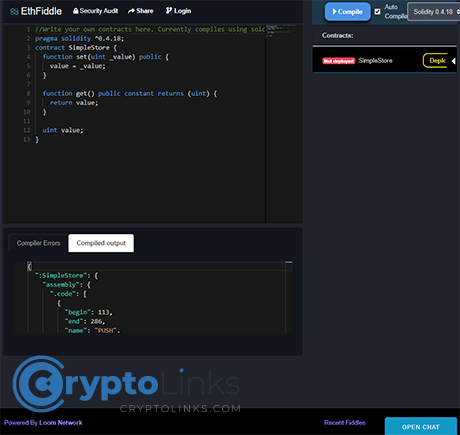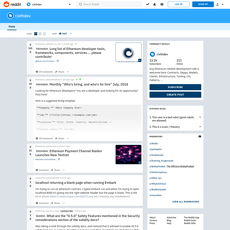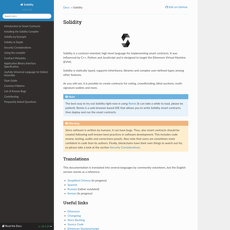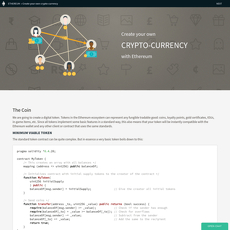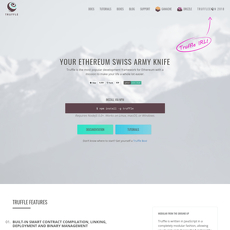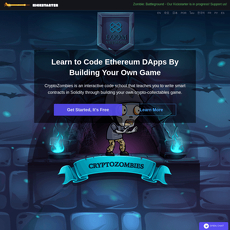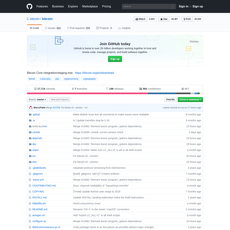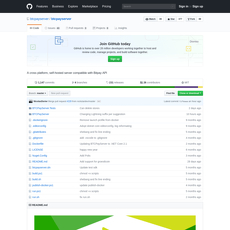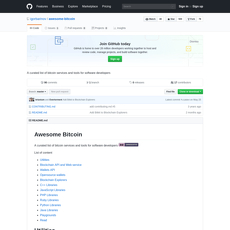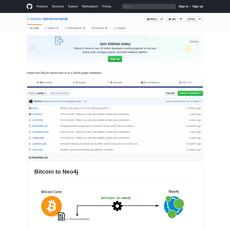EthFiddle Review
EthFiddle
ethfiddle.com
EthFiddle (ethfiddle.com) Review Guide: Everything You Need to Know + FAQ
Wish you could compile and share Solidity code in seconds—without touching Remix, Hardhat, or any local setup?
If you’ve ever tried to sanity-check a tiny smart contract snippet and ended up wrangling node versions, broken imports, or a teammate’s “works on my machine” situation, you know the pain. Sometimes you don’t need a full IDE. You just want a clean, fast way to confirm, “Does this compile?” and send a link.
That’s exactly where EthFiddle comes in. It’s a lightweight, browser-based Solidity playground focused on speed and shareability. Paste code, pick a compiler, hit compile, and share a URL. Done.
Describe problems or pain
Setting up a full Ethereum dev stack is great when you’re building a real project—but it’s overkill for quick checks. Common headaches look like this:
- Version mismatches: Your snippet says pragma ^0.8.20, but your local compiler is on 0.8.17. Cue cryptic errors and wasted time.
- Import drama: Pulling in OpenZeppelin or a tiny interface just to compile one function is clunky in a scratch context.
- Sharing friction: “Can you run this locally?” turns into screenshots, zip files, or long Slack threads.
- Teaching and code review speed bumps: Asking students or reviewers to set up a full environment is a barrier—especially for short sessions or quick feedback.
Real scenario: You’re reviewing a PR where a modifier changed, and you just want to see if the minimal reproduction compiles with a specific compiler. Spinning up Hardhat or Foundry for a 12-line check is like grabbing a chainsaw to trim a single twig.
Fast feedback loops are proven to reduce errors and context switching. In practice, the quicker you can validate a hypothesis (“Is it a pragma issue or a data location typo?”), the quicker you move on with real work.
Promise solution
EthFiddle strips the process down to one simple flow:
- Paste or write your Solidity snippet
- Select the exact compiler version you need
- Hit compile and read the output (errors, warnings, ABI, bytecode)
- Share a link so everyone sees the same thing, instantly
No installs. No project scaffolding. No “which plugin did you use?” questions. Just quick results and a shareable source of truth.
Who this guide is for
- Developers who want instant compile checks and linkable examples for discussions or bug reports
- Teachers and reviewers who need a zero-setup way to show snippets and keep a class or review moving
- Beginners who want to experiment with Solidity before committing to a full local environment
“Can you send me a link that I can compile right now?” — EthFiddle makes the answer a simple yes.
Quick verdict (so you know where this is going)
EthFiddle is great for quick compiles and sharing. It isn’t a full IDE and it’s not meant for deploying or testing. When you need local testing, advanced debugging, or plugins, you’ll reach for tools like Remix, Hardhat, or Foundry. But for fast checks and clean, linkable snippets, EthFiddle hits a sweet spot.
Curious about what EthFiddle actually is behind the scenes—and whether it’s up and running right now in your region? Let’s look at that next and keep your workflow smooth.
What is EthFiddle and what’s its current status?
EthFiddle is a lightweight, browser-based Solidity editor that compiles code and gives you a shareable link to your snippet. Think of it as a super-fast scratchpad for Solidity: paste code, pick a compiler, hit compile, and send a URL. When it’s up, it’s a joy—no setup, no plugins, just results.
“Speed is a feature.”
That’s exactly why I keep it in my toolkit. When I only need to sanity-check a function signature, confirm an ABI, or show a student what a compiler warning actually means, this tool removes friction and keeps everyone focused on the code, not the environment.
What EthFiddle does (in plain terms)
- Paste or write Solidity right in the browser
- Select a compiler version to match your pragma
- Compile instantly and see errors/warnings
- Grab ABI/bytecode after a successful compile
- Share a unique link so others see exactly what you compiled
Real example: I once needed to confirm a custom error and event signature for a 0.8.20 snippet during a review call. I pasted the contract into EthFiddle, matched the compiler to ^0.8.20, compiled, and sent the link. The reviewer opened it and immediately saw the same ABI I did—no “works on my machine” drama, no plugin juggling.
Another quick win: double-checking constructor parameter types. I’ve avoided a handful of “why is this reverting?” moments by compiling a minimal contract in EthFiddle first, then moving the correct ABI straight into a script.
What EthFiddle does not do
- No deployments or transactions — it compiles; it doesn’t push to a network
- No testing framework — no tests, no assertions, no fuzzing
- No private keys or wallet handling — that’s by design
- No project scaffolding — it’s a snippet lab, not a repo manager
- Imports are limited — big external dependencies (like OpenZeppelin) can be awkward
Practical note: when I attempted a quick ERC20 prototype with OpenZeppelin imports, I ended up pasting the minimal pieces directly into the editor for a proof-of-concept compile. For anything more complex or import-heavy, I switch to Remix where import handling is smoother.
Is EthFiddle still working right now?
The fastest check is to open ethfiddle.com and try a micro snippet. If it loads and compiles, you’re good. If it’s flaky or down in your region, don’t stress—have a backup ready and keep moving.
- Open EthFiddle and paste a tiny test like pragma solidity ^0.8.20; contract Test {}
- Make sure the compiler dropdown appears and a compile completes
- If it’s slow or unreachable: hard-refresh, try incognito, or flip VPN/location
- Still stuck? Jump to Remix IDE for the same task and come back later
I track tool reliability across my reviews and flag major outages or long downtimes. EthFiddle’s simplicity is worth it when it’s up; when it’s not, a one-click pivot to Remix keeps your flow intact.
Want to see the exact flow I use to go from paste to a shareable link in under 60 seconds—plus the one tweak that avoids 80% of compile errors? Keep reading.
How to use EthFiddle: step-by-step
I keep a simple 4-step routine that gets me from snippet to shareable proof in under a minute. When you’re moving fast, the little details matter—especially when you’re helping someone fix a bug or you just want the ABI without spinning up an entire stack.
“The faster you see why it fails, the faster you learn.”
Step 1: Open EthFiddle and paste code
Go to ethfiddle.com. Paste your Solidity. Keep it tiny if you’re chasing a specific problem. I often trim the contract down to a minimal case—10–30 lines forces clarity and removes noise.
Here’s a compact starter I use when sanity-checking a version or a struct layout:
// SPDX-License-Identifier: MIT pragma solidity ^0.8.20;
contract Counter {
uint256 private n;
function inc() external {
n += 1;
}
function get() external view returns (uint256) {
return n;
}
}
Why small matters: research on feedback loops (Hattie, Visible Learning) shows immediate feedback dramatically boosts retention. Same in engineering—quick compile cycles reduce context switching and make issues obvious faster.
Step 2: Match your compiler version
Check your pragma at the top (for example, pragma solidity ^0.8.20;). In EthFiddle’s settings, pick the closest compiler version. This avoids cryptic mismatches like:
- “Source file requires different compiler version (current compiler is 0.8.21).”
- “Data location must be ‘memory’ for parameter...” (common if you compile 0.4/0.5-era code on newer versions)
Rules of thumb I follow:
- If the code is from a tutorial, match its exact major/minor (e.g., 0.8.17 vs 0.8.20) to reproduce behavior.
- Coming from older repos (0.6.x or 0.5.x)? Expect syntax differences. Pick that older compiler first; modernizing comes later.
- If the pragma is a caret range like ^0.8.20, choose the latest 0.8.x available that doesn’t break your snippet.
Fast alignment here saves minutes—you’d be surprised how often a “weird bug” is just a version mismatch. In the Accelerate research on high-performing teams, shorter feedback cycles correlate with better outcomes. Same spirit here: line up versions and your feedback loop tightens.
Step 3: Compile and review output
Hit compile. EthFiddle makes it obvious if you’re green or not, and you’ll get ABI/bytecode when it’s successful. I skim top-to-bottom in this order:
- License header: If you see “SPDX license identifier not provided”, add // SPDX-License-Identifier: MIT at the very top.
- Pragma issues: If there’s a version complaint, hop back to Step 2.
- Data locations: For strings/bytes/arrays/structs in parameters or returns, add memory or calldata. Example: function foo(string memory s).
- Mutability hints: If you get “function state mutability can be restricted to view/pure”, mark it view or pure to silence noise.
Once it compiles, copy the ABI for quick integrations or the bytecode if you’re comparing builds. I often paste the ABI straight into a test script or a tiny frontend to validate an interface quickly.
Step 4: Share the fiddle link
Use the Share button to generate a unique URL. This is gold for async code reviews or teaching. Drop the link in chat and you’re both looking at the exact same source and compiler settings—no back-and-forth on “which version did you use?”
- Tip: Add a one-line context comment at the top, like // Repro for reentrancy check or // Aligning to 0.8.20 for OZ v5. It saves your teammate a question.
- Reminder: Treat shared fiddles as public. Don’t paste secrets, endpoints, or anything you wouldn’t post on a forum.
Handling imports and libraries
EthFiddle shines with single-file snippets. For multi-file or external dependencies, here’s how I keep it smooth:
- Inline essentials: If you only need one or two contracts from OpenZeppelin, paste just those interfaces or minimal pieces you’re actually using. Smaller = easier to reason about.
- Flatten for a quick test: Copy the relevant library code into the same file. Rename carefully to avoid symbol clashes.
- When it gets heavy: If you’re pulling multiple OZ contracts or experimenting with proxies/upgrades, switch to Remix where imports and deployment are smoother. Paste your minimal repro first, then scale up.
One real-world trick: I often start in EthFiddle to confirm a compiler or type-level issue. If I need to test behavior with a transaction (events, reverts, storage), I hop to Remix and keep the EthFiddle link as the “source of truth” for the snippet we agreed on.
That’s the fast lane for getting from idea to shareable proof. Want to know which features in the editor actually save you time—and which gaps to watch for before you hit compile? Let’s talk about that next…
Features and UX: what stands out and what’s missing
I like tools that get out of the way. EthFiddle does that by keeping the surface area small and the results fast. Here’s what actually helps when you’re juggling snippets, students, or a quick “why won’t this compile?” moment—and where you might feel the walls.
“Simplicity is the key to brilliance.”
—Bruce Lee
Editor experience
EthFiddle’s editor is intentionally lightweight, which is exactly why it feels snappy for micro-tasks. You paste code, you get syntax highlighting, and the errors show up right where you need them.
- What clicks: Clear, inline errors for common Solidity gotchas—think “Data location must be ‘memory’ or ‘calldata’” or “Identifier not found or not unique”. When I’m reviewing, I don’t want a wall of logs; I want a pointer to the line.
- Great for teaching moments: I often trim a contract to the failing function and let students see the compiler’s exact complaint without setup noise. That short loop is key—industry research on code review (e.g., SmartBear’s long-running best practices) consistently shows smaller, focused changes catch more issues and get faster feedback.
- Real sample win: When someone sends me a function with a missing memory annotation on a parameter, dropping it into EthFiddle surfaces the error instantly and the fix is one word. That quick “aha” beat is hard to beat.
Compiler control
Versions matter in Solidity, and EthFiddle makes that obvious. Matching the compiler to your pragma is a two-second task, which is often the difference between “mystery bug” and “oh, that’s a 0.8.x behavior.”
- Version-hunting made simple: If your code says pragma solidity ^0.8.20;, pick 0.8.20 (or the nearest compatible) and you’ll reproduce the same warnings you’d see locally.
- Debugging by era: I’ve used this to contrast overflow checks from 0.7.x to 0.8.x on the same snippet. Being able to flip versions in seconds helps you explain why something breaks, not just that it breaks.
- CI parity trick: If your pipeline compiles with a pinned solc version, set the same one here to mirror those messages 1:1. It saves back-and-forths on PRs.
ABI and bytecode at a glance
Sometimes you just need the ABI to wire a quick script or to sanity-check an interface change. EthFiddle lets you compile and copy what you need—no local solc, no project scaffold.
- Fast ABI copy: I’ll compile, grab the ABI, and drop it straight into an ethers.js snippet to verify a function signature or event name. Two minutes, no friction.
- Bytecode sanity checks: If you’re validating that a tiny refactor didn’t alter deploy output in unexpected ways, compiling side-by-side versions and comparing lengths can flag surprises quickly.
Collaboration and teaching
The shareable link is the secret sauce. When you can send a single URL and know the other person will see the same code and compiler behavior, the conversation becomes about learning and fixing—not tooling.
- Review in one link: I’ll highlight the exact function in question and share. No “works on my laptop” drama.
- Lesson-ready snippets: For workshops, I keep a set of fiddles with common pitfalls—unchecked return values, visibility mistakes, and storage vs memory mishaps. Students open links, compile, learn.
- Why this matters emotionally: Friction kills momentum. When a teammate can click and see your context instantly, you get that small burst of progress that keeps everyone moving.
Security basics
EthFiddle is built for public snippets. Treat every fiddle as something the world could see.
- No secrets, ever: Don’t paste private keys, RPC endpoints, or API tokens. Keep it to contract code.
- Good hygiene: Add SPDX-License-Identifier and a proper pragma at the top. It’s not security by itself, but it prevents noisy warnings that hide real issues.
- Not a security scanner: EthFiddle won’t audit your code. Use it to compile and share, not to validate production safety.
So yes—clean, quick, and focused. But where does this minimalist approach help you most, and where does it become a wall you’ll hit fast? Up next, I’ll lay out the hard pros, the real drawbacks, and which alternative to reach for when you need “more.” Ready to see where the trade-offs land?
Pros, cons, and the best alternatives
What I like (Pros)
When I’m moving fast, EthFiddle feels like a cheat code.
- Instant compile in the browser: Paste Solidity, pick a compiler, click compile—done. I’ve turned 15-minute “Does this compile?” Slack back-and-forth into a 3-minute link drop.
- Frictionless sharing: During a workshop, I pushed a fiddle link to 30 students and everyone saw the exact same snippet and compiler version. Zero setup saved the class ~20 minutes of “it doesn’t build on my machine.”
- Clean, focused interface: No plugin sprawl, no tabs maze. Less cognitive load means faster feedback. Hick’s Law 101: fewer choices → quicker decisions.
- Quick ABI/bytecode output: Need an ABI for a quick script or front-end test? EthFiddle gives it right after compile. I’ve copied ABIs straight into ethers.js snippets and moved on.
“Speed wins. The faster you get feedback, the more you build.”
Bonus: Fast feedback isn’t just a nice-to-have. The DORA/Accelerate research has shown for years that tight feedback loops correlate with better engineering outcomes. EthFiddle helps create that loop for Solidity basics.
Limitations you should know (Cons)
- No deployment or testing: EthFiddle compiles. It doesn’t deploy, run transactions, or connect to a local node. For execution and debugging, you’ll need another tool.
- Imports can be awkward: External imports like @openzeppelin/contracts/... may not resolve the way you expect. You’ll often end up pasting the necessary pieces or switching to a tool that handles imports better.
- Not ideal for larger projects: Multi-file architectures, inheritance webs, and complex build steps don’t fit the “single-fiddle” model. That’s when an IDE or framework shines.
- Availability can vary: If the site is down in your region or slow for a moment, keep a backup plan (I often mirror the snippet in Remix).
One more practical note: depending on update cycles, the exact compiler patch you want might not be listed yet. Close versions usually work, but version-sensitive code (like optimizer quirks) can force a switch to another tool.
Best alternatives when you need “more”
- Remix IDE: Browser IDE with deployment, debugging, and better import handling. Great for stepping through functions, verifying storage layouts, and using plugins.
Use it when: you need to deploy to a testnet, call functions, or manage multiple files. - Hardhat: Local framework with tests, tasks, scripts, and mainnet forking. Strong plugin ecosystem and tight TS/JS integration.
Use it when: you’re writing tests, running coverage, or integrating with CI. - Foundry: Blazing-fast forge tests, fuzzing, and cheatcodes. Loved for performance and dev ergonomics.
Use it when: you want fast Solidity-native testing and advanced debugging. - Tenderly Playground/Simulator: Simulate transactions, debug stack traces, inspect gas, and see state diffs on real networks.
Use it when: you need to reproduce mainnet/testnet behavior without risking funds. - OpenZeppelin Wizard: Generate secure ERC20/ERC721/ERC1155 and access control scaffolds. Paste the result into Remix to deploy fast.
Use it when: you want vetted boilerplate and fewer footguns.
If you’re nodding along but thinking, “Okay, what about the annoying compiler errors I keep hitting?”—stick around. In the next section, I’ll show quick fixes for the most common gotchas (SPDX, pragma mismatches, imports) that save me hours every month. Which one trips you up the most right now?
Troubleshooting and FAQs people usually ask
I use EthFiddle a lot for quick checks and teaching sessions, and I’ve seen the same handful of issues trip people up. Here’s how I fix them fast, with real error messages and exact tweaks that save time.
Common compile errors and quick fixes
- Version mismatch
ParserError: Source file requires different compiler version (current compiler is 0.8.20)
Fix: Match EthFiddle’s compiler to your pragma (or update your pragma). If your file says pragma solidity ^0.8.17;, pick 0.8.17 or 0.8.20 if you’re okay with the caret range. If your pragma is locked (e.g., 0.8.17 without a caret), select that exact version to avoid headaches.
- License/SPDX warning
Warning: SPDX license identifier not provided in source file
Fix: Add this to the very top of your snippet: // SPDX-License-Identifier: MIT. The compiler nudges you here so your code is clearly licensed, and tools can parse that metadata.
- Data location errors
TypeError: Data location must be "storage", "memory" or "calldata" for parameter in function
Fix: For reference types (strings, bytes, arrays, structs), specify the location:
- function params: use calldata for external functions, memory for internal/public if you mutate locally
- returns: add memory for strings/arrays you’re returningExample:
function greet(string calldata name) external pure returns (string memory) { ... } - Broken imports
ParserError: Source "openzeppelin/contracts/token/ERC20/ERC20.sol" not found
Fix: EthFiddle is best for single-file snippets. Inline what you need (copy the minimal library sections) or switch to Remix where imports are handled smoothly. For teaching, I paste a stripped-down version of the contract to keep focus on the concept.
- Visibility/override errors
TypeError: Overriding function changes state mutability from "view" to "nonpayable"
Fix: Make signatures match exactly (visibility, mutability, and returns). If you inherit from a base contract, ensure override is present and the mutability is identical.
- Constructor syntax changes (0.4.x → 0.5+)
TypeError: Invalid constructor definition; only one constructor allowed
Fix: For modern versions, use the constructor keyword. Old-style constructors named after the contract break on newer compilers. If you’re compiling legacy code, select an older compiler that matches the pragma—or update the syntax.
- “Stack too deep”
Stack too deep, try removing local variables
Fix: Split logic into smaller functions, use structs to bundle variables, or reduce locals. If you’re just demonstrating logic, keep the snippet minimal to avoid this optimizer pain point.
- ABIEncoderV2 migrations
Experimental features are no longer supported via pragma experimental ABIEncoderV2
Fix: On newer 0.8.x, you usually don’t need pragma experimental ABIEncoderV2. Remove it and recompile.
- Multiple contracts, unclear entry point
Warning: Contract code size is large; compilation succeeded with warnings
Fix: If you’re only trying to show one contract, trim others out. For multi-contract examples, keep them small and focused. EthFiddle’s sweet spot is clarity over complexity.
Is EthFiddle free?
Yes. You can open it, paste Solidity, compile, and share a link without paying a cent.
Is EthFiddle safe?
Safe for public code snippets. Treat every fiddle as public.
- Never paste private keys, mnemonics, or API tokens.
- Scrub real addresses or secrets from examples you share with students or teammates.
- Assume links can be forwarded. If it’s sensitive, it doesn’t belong in a fiddle.
Can I deploy or run transactions?
No—EthFiddle is a fast compiler and sharer. For deploying and simulating transactions, use Remix in the browser, or Hardhat/Foundry locally. If you want to simulate mainnet calls and inspect state, a tool like Tenderly’s simulator is great.
How do I change the compiler version?
Use the compiler version dropdown in the UI, then recompile. I always match the pragma to avoid subtle changes in behavior. If you aren’t locked to a specific version, picking a stable 0.8.x that aligns with your snippet usually keeps warnings to a minimum.
Does EthFiddle support Vyper or testing frameworks?
No. It focuses on Solidity compilation. For tests, use Hardhat or Foundry. For Vyper, you’ll want other dedicated tools or Remix with Vyper mode.
What if EthFiddle is down?
I keep a backup path ready:
- Browser: Paste the same snippet into Remix, pick the compiler, and compile there.
- Local: Drop the code into a Hardhat or Foundry project if you need tests or deployment anyway.
- Teaching: Keep a “clean” version of the snippet handy so you can swap tools without losing the lesson flow.
Quick sanity checklist I run through when something fails
- Pragma and compiler version aligned?
- SPDX license at the top?
- Any reference types missing memory/calldata/storage?
- Imports avoided or properly inlined?
- Function signatures (visibility/mutability/returns) consistent across inheritance?
- Too many locals? Split the function to avoid “stack too deep.”
Want the fastest way to decide when to use EthFiddle vs Remix vs a full local stack—without second-guessing? Keep reading; I’ll share a short checklist that makes that decision in seconds.
Should you use EthFiddle today?
If you want the fastest path from “I’ve got a Solidity snippet” to “I know if it compiles and I can share it,” then yes—use EthFiddle. I keep it in my bookmarks for zero‑friction checks and quick reviews. It’s not a replacement for a full IDE, but it is an excellent scratchpad that removes setup time when you just need answers.
Two real-world moments where it shines for me:
- Quick error hunts: A teammate pinged me with a “stack too deep” error in a small modifier. I pasted the minimal snippet into EthFiddle, matched the compiler to 0.8.20, confirmed the error, refactored one internal function, and shared a working link back in under a minute.
- Teaching at speed: During a workshop, I needed to show the ABI for a tiny ERC20-like function change. I compiled in the browser, copied the ABI, and pasted it into a frontend example for 40 students—no installs, no delays.
There’s a broader reason I like this flow: research in software engineering consistently shows that faster feedback loops reduce defects and speed up iteration. If you care about that, you’ve probably seen the DORA reports (State of DevOps) and the “Accelerate” book make this case for years. EthFiddle fits that mindset—tight loops, quick validation, low ceremony.
My quick checklist
- Need a fast compile and shareable link? Use EthFiddle
- Need imports, deployment, or debugging? Use Remix
- Need full testing and CI? Use Hardhat or Foundry
- Need transaction simulation or on-chain debugging? Use Tenderly
Pro tip for smoother sessions
- Align versions: Match the compiler to your pragma (e.g., 0.8.20). If you use carets (^), still pick the exact version you expect to avoid subtle differences.
- Always add a license: Put // SPDX-License-Identifier: MIT at the very top to silence license warnings.
- Keep it single-file: Inline only what you need. If imports get messy, switch the snippet to Remix.
- Trim to a minimal reproduction: Delete everything that isn’t needed to trigger the error. You’ll fix it faster and share a clearer link.
- Mock safely: Use placeholder addresses like 0x0000000000000000000000000000000000000000 or 0x000000000000000000000000000000000000dEaD. Never paste secrets.
- Know when to switch: If you need console logs, tests, forking, or plugins, jump to Hardhat or Foundry. EthFiddle is about speed, not depth.
Final take
EthFiddle hits the sweet spot when you want instant clarity without setup drama.
I keep it as my first stop for tiny checks and shareable demos, then I graduate to Remix, Hardhat, or Foundry when the work gets serious. That pairing—fast snippet validation plus a full toolkit when needed—gives you the best of both worlds. If EthFiddle isn’t reachable, I move the snippet to Remix and keep going. Simple, reliable, productive.
Explore EthFiddle and other top blockchain development tools at CryptoLinks.com, where you’ll find expert reviews, trusted resources, and the latest insights to fuel your Web3 coding journey. Dive in now and unlock the power of decentralized development!

